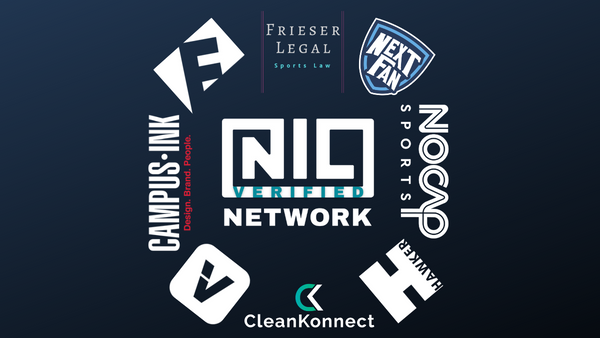The membership program represents a critical step forward in creating a more equitable and trustworthy NIL landscape for college athletes

SAN DIEGO (FEBRUARY 16, 2023) . NIL Network today launched the NIL Verified Network, a membership program of service providers dedicated to ensuring transparency, honesty, and fairness within the emerging NIL industry. Inaugural members are NOCAP Sports, Hawker Family Sports & Entertainment, NextFan, FanWord, Frieser Legal, CleanKonnect, Campus Ink, and Vantage Sports - all companies that have demonstrated their athlete-centered business models.
As college athletes navigate the NIL landscape, it has become increasingly important for them to be able to differentiate between trustworthy service providers and those that seek to exploit the lack of regulation in the field.
Michelle Meyer, founder of NIL Network and former NIL Coordinator at San Diego State University, started building the NIL Verified Network program in May of 2022 after witnessing firsthand the frustrating reality that’s happening on the ground floor, well outside any NIL headlines.
"Bad actors are thriving in the wild west landscape right now,” Meyer explained. “Social media allows these opportunists to directly access the athletes, where they exaggerate their credentials, over promise their services, and will say pretty much anything to gain the athlete’s trust. Then, they pressure these young adults to sign horribly one-sided contracts, knowing that most college athletes don’t have the support to fully understand what they’re agreeing to. I’ve seen it too many times already. Enough is enough."
NIL Network is striving to eliminate these bad actors by bringing together the athlete-centered NIL businesses, supporting their efforts, and amplifying their brands.
Meyer continued, “I am ecstatic to finally get the NIL Verified Network launched and am grateful to have the support and commitment from our inaugural members. All of these initial businesses have stood out to me over the past few years as being innovative, collaborative, and most importantly, hyper-focused on the athlete experience. They immediately recognized the importance of a network like this and have been so patient as we’ve worked through the business vetting process and standards.”
That standard, NIL Verified™, is the first-to-market NIL service provider verification process and is a requirement to become a member of the NIL Verified Network. Developed with the expertise of former Power 5 compliance director and current Freeman┃Lovell partner Patrick Stubblefield, NIL Verified™ aggregates information about a business’ registration, employees, business practices, and compliance with NIL laws, NCAA interim policies, and institutional policies. Additionally, it includes a review of the service provider’s terms to ensure they include all of the expected clauses and fair language for college athletes.
“An entirely new industry popped up nearly overnight once the NCAA’s rules around NIL relaxed. Through this NIL Verified process, I think we’re helping push the industry to maturity,” stated Patrick Stubblefield, attorney at Freeman | Lovell. “Being familiar with state NIL laws should be the industry standard. Deploying ethical payment terms should be the industry standard. Fair contracts that do not take advantage of athletes should be the industry standard. I believe that services such as NIL Verified can help push towards a reality where the industry standard is to engage with athletes ethically.”
With the NIL Verified Network, athletes and administrators can have confidence that they are partnering with companies that prioritize their best interests, making the NIL industry a safer and more equitable place.
ABOUT NIL NETWORK
NIL Network was founded in 2020 as a free resource to help athletes, coaches, and administrators understand the NIL changes that were coming the following summer.
Today, NIL Network is a platform that equips athletes, administrators, and other early adopters with industry leading databases, objective resources, and trustworthy connections so they can succeed in the nascent name, image, and likeness era of collegiate sports.
Media Contact:
Michelle Meyer
Founder, NIL Network




